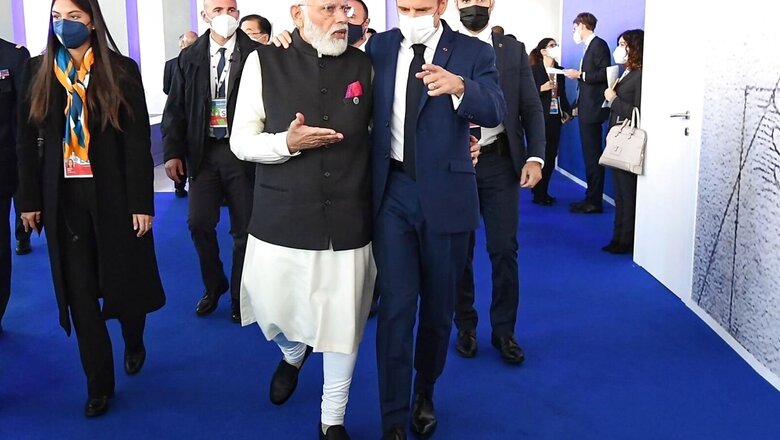
views
The wordy and ambitious ‘Rome Declaration’ was adopted on October 31 after five days of extensive negotiations at the conclusion of the 16th G20 summit. Prime Minister Narendra Modi led the Indian delegation and played a proactive role in shaping its agenda and outcome. India would now become a part of the G20 Troika on December 1, 2021 as the host nation for the 2023 summit.
Just when the anti-G20 voices were getting shriller, the grouping has delivered again. It took a Herculean effort to endorse and adopt the significant OECD (Organisation for Economic Co-operation and Development) deal on minimum global corporate tax to plug a glaring loophole being merrily exploited by multinational giants, by parking profits in a subsidiary in a tax haven. Significantly, 136 countries out of 140 have agreed, with certain caveats in some cases, to introduce a minimum 15 per cent corporate tax beginning January 1, 2023.
Notwithstanding the diehard critics, the quantum of tax is reasonable and fair. That it will be implemented by countries accounting for 90 per cent of the global GDP itself demonstrates its pressing need. It would increase GDP growths between of 0.2 to 0.9 per cent in one stroke (IMF Blog) and be particularly beneficial for emerging economies like India. It is noteworthy that Prime Minister Modi had been a strong advocate of the reform and had pressed for it in his very first G20 Summit outing in 2014. President Biden hailed it as— “diplomacy reshaping our global economy and delivering for our people”.
PM’s Pitch at G20
The theme of the summit was ‘People Planet and Prosperity’ and principally focused on recovery from the pandemic, revival of economic growth, climate action, sustainable development and health and nutrition. In one of the salient outcomes, the developing countries led by India were once again able to include and reiterate the principle of common but differentiated responsibilities in the Declaration. Which basically puts the onus on the developed world as the polluter-in-chief to do the heavy lifting, including providing at least $100 billion every year until 2025. Surprisingly, Afghanistan found no mention in the Declaration despite an extraordinary meeting of G20 leaders on Afghanistan having been convened on October 12, 2021.
With respect to the COVID pandemic, the Prime Minister referred to his vision of ‘One Earth – One Health’ implying that no country was an island or immune to the scourge. He emphasized cooperation in smooth supply of raw material and early approval by WHO to India-made vaccines. That India was walking the talk was evident in his announcement that domestic capacity has been ramped up to produce 5 billion doses in 2022. In his intervention at the ‘Global Summit on Supply Chain Resilience’ convened by President Biden, PM Modi spoke in a similar refrain.
PM Modi announced a series of climate mitigation measures to significantly reduce GHG (greenhouse gas) emissions in India. He took the developed world to task for failing to do ‘climate justice’ and not earmark adequate resources for the development of green technologies which can help the developing countries in transitioning to energy-efficient options.
ALSO READ | COP26: With Developed World Not Doing Its Bit, India’s Case for Climate Justice is Strong
A Rousing Reception
While the G20 Summit is important in itself, the formal and informal interactions between the heads of states and governments on its margins are as meaningful. Between Rome and Glasgow Modi would have interacted with practically every major world leader present. Diplomats have coined colourful phrases to describe these conversations—pull-aside, stand-besides, fireside chat and now also ‘fountain side confabs’, as the leaders cheerfully congregated for a family photograph at the iconic Trevi fountain in Rome.
Images of President Biden engaged in a conversation with an arm around PM’s neck or French President Macron engaging him in bear hug (Covid-19 or not) have their own story to tell. The affection and warmth that most world leaders exude towards PM Modi is exceptional. While all leaders are hard-nosed and very mindful of national interests, the personal chemistry does make a difference and a crucial one at that. After all they too are humans, susceptible to emotions and perceptions which have a bearing on their decisions. President Nixon’s dislike for Mrs Gandhi led him to order the 7th Fleet into the Bay of Bengal during the 1971 India-Pakistan conflict. President Bush’s fondness for Manmohan Singh got India out of the nuclear cold.
For Pope Francis to drop his customary reserve, embrace Modi like a long-lost friend, extend the audience to an hour as against the scheduled 20 minutes as well as readily accept his invitation to visit India would have been a bitter medicine for the ‘professional’ India-bashers, both within the country and abroad, to swallow.
And not to forget the rousing welcome the Indian diaspora gave the Prime Minister in Rome! Quite a few of them had travelled overnight to get a glimpse of the Prime Minister. “He is rebranding India’s name,” remarked one of his admirers.
One does not recall any Indian leader enjoying rockstar-like popularity with the Indian diaspora in recent decades. The same phenomenon obtains in India with 70 per cent of the populace having a favourable opinion of the Prime Minister, the highest among 13 global leaders polled in a survey conducted by Morning Consult in early September, who is in his eighth year of office.
The Future of G20
Overall, the first leg of PM’s tour was action-packed and productive.
But what about the future of G20?
Notwithstanding that it is the most democratic and representative body devoted to harmonisation of fiscal and economic policies of 19 of world’s largest economies, the task is proving to be uphill. That the emerging economies do not have a similar experience as advanced economies in working together, is a complicating factor. Second, the emerging economies have not been very adept at pushing their development agenda which is at variance with the priorities of the advanced economies. Third, the advanced economies have not demonstrated the political will to reform the Bretton Woods institutions, despite committing to do so. There is no reason to continue the convention of an American heading the World Bank and a European the IMF.
All the same, with all its frailties, G20 is the best institution that the world has at present. Instead of throwing the baby out with the bathwater, the need of the hour is to further invest in the grouping to develop a habit of cooperation. The G20 has shown that it can deliver under pressure or in a crisis. Why not in normal times? There are no easy answers!
The author is Former Envoy to South Korea and Canada and Official Spokesperson of the Ministry of External Affairs. The views expressed in this article are those of the author and do not represent the stand of this publication.
Read all the Latest News , Breaking News and IPL 2022 Live Updates here.




















Comments
0 comment